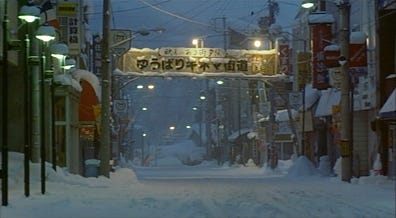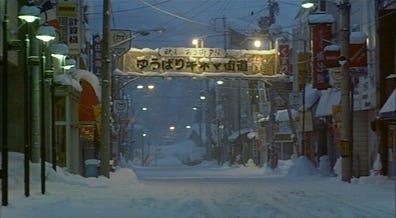Lost in the World with Millennium Mambo
"Millennium Mambo is still as vivid and alive as it has ever been."
A disembodied voice, it sounds like Shu Qi’s, looks back on the turn of the 21st century and on Vicky, the character she plays in Hou Hsiao-hsien’s Millennium Mambo but only distantly refers to as “her”, from ten years in the future. But even at that remove and in retrospect she doesn’t find much order. At some point Vicky’s life slipped into a spiral and the only thing that gives it some kind of centre is that she’s spiralling around Hao-Hao (Tuan Chun-hao), the empty and abusive boyfriend that she always finds herself returning to “as if under a spell, or hypnotised”.
In one scene she’s left him for good and in the next she’s back in their shared apartment, though the exact cause or even the order of these events are obscured. As Vicky’s memories have started to fade they’ve lost their precision and chronology but have become more expressive and true: that we can’t tell which point in their relationship any given scene is located only paints a more precise picture of their endless cycle; from afar each dot of momentary justification becomes part of a pattern and eventually a shape.
The complete image that those shapes form remains elusive even another ten years from the narrator and twenty from the setting and original release. Hou Hsiao-hsien’s consuming and abstract style hasn’t been flattened into an aesthetic (it’s not been screenshot to death, though this might be because the film has only recently become available in the beautiful quality that it both requires and deserves), its structure—with strange corridors, sharp turns and perfect circles—and the ambiguities within haven’t been solidified from interpretation. In order words: Millennium Mambo is still as vivid and alive as it has ever been.
Memory is the typical (or to be unkind: clichéd) lens through which Hou’s work is understood, but it’s imprecise for Millennium Mambo especially. Certainly the narrator sits at a much stranger distance from Vicky than time, but simpler than that: the film perfectly captures the first-hand experience of feeling, and actually being, lost in your own life. And it stays within that limited point of view. As Vicky wanders through life, never quite sure how she ended up wherever she is, Hou’s camera follows in step, as if searching for a point of focus and never quite finding one or trying desperately not to hold on anything for too long. There’s always something else pulling and both Hou and Vicky let themselves be pulled. Whether by the silent whims of history, the comfort of the familiar or the violent impulses of a partner, it doesn't matter as long as it keeps them in motion.
This drive for a consuming presentness is at the very centre of the film: this sense of history is unique to the turn of the millennium and to fall in perfect rhythm, and therefore total unawareness, with these now invisible forces is the dance therein. And so naturally, Vicky often finds herself in clubs. The clinical blast of LED’s haven’t quite reached the Taipei of 2001 and so their lights still glow with the warmth of fire and even the backlight that flatly covers the dance floor turns every smile pure and bursting white.
Under the pulse-setting thrum of the music—which carves this chaos into a certain kind of bodily sense and makes even the fights (usually started by Hao-Hao) look choreographed—Vicky seems the most, and therefore is the least, herself; she can slip into and perfectly embody this moment and no others, just as the camera does when it falls into the beautiful abstraction of lights out of focus. The most painful moments always come in clear view—like each of Hao-Hao and Vicky’s sexual encounters, which range from impotent and non-sensual to dry and ritualistic—but then, so do the little moments of (personal, not moral) redemption. Hope and despair sits closely aside, as they often do, making each as painful to look at as the other.
And so Vicky gives herself over to the music and Hao-Hao tries to control it. He spends much of his free time standing alone in his dimly lit room (which in their second, slightly less dire apartment seems totally separate from Vicky’s) brewing away at some kind of solipsistic DJ-ing. He doesn’t seem like someone who does a lot of creating. The only thing he’s constructing is a sense of control and then not even for control itself, but for the feeling of enacting it.
He looks through Vicky’s cell phone records—that only show the length of the call, not even the number she’s called—because they are a perfect blank conduit through which he can incense himself and conjure his rage. In this he has something in common with Frank Booth and Bobby Peru and Bob and most of David Lynch’s villains. David Foster Wallace described them as people that “are not themselves evil [...] evil wears them. [...] they have yielded themselves up to a Darkness way bigger than any one person”1. He too is under a spell, hypnotising himself to ignore his empty centre.
There’s no question that he has alienated Vicky in very real and material ways, like when he leaves her to sleep through her final high school exams so that when she’s not dependent on him she has to work as some kind of hostess/sex worker. And that this has an emotional weight too, when another character says Vicky could get a job in a coffee shop she can hardly believe they have so much faith in her. But both are unmoored by the larger forces of history, even though they are left almost entirely absent from the text, only echoing in from the title and the narrator’s consistent reminders that “this happened ten years ago [when] the world was greeting the 21st century and celebrating the new millennium.”
This is easier to understand in contrast to Hou’s fellow Taiwanese New Waver and frequent collaborator Edward Yang, whose broad scope and complex intersection of different characters living all sorts of different—but in some fundamental and thematic sense familiar—lives created a precise geography of alienation. Taipei Story, for example (which Yang co-wrote with Hou and Hou’s screenwriting partner Chu T’ien-wen) doesn’t end with the forces of atomisation destroying Ah-Lung (played by Hou) and turning him to smoke, but with his wife (Tsai Chin) looking out at the city reflected on the glassy facade of a skyscraper. Millennium Mambo is not at such a remove, it shows the forces of atomisation as they are felt (again, showing Hou’s powerful interest in presentness), and so they are necessarily as invisible, or at least elusive, to us as they are to Vicky and Hao-Hao and everyone else.
It might seem definitionally impossible, then, for them to see a way out—and this underlying bleakness may be exactly what stopped such a visually attractive film from being crushed into a cutesy-melancholic “aesthetic”—but hope still exists, it pulses away quietly in the background, even if in abstract form. It’s there from the very first scene—where narrator-Qi tells us this all happened to character-Qi ten years ago; in the past—there’s something in the unconscious way Vicky looks back and sees nothing behind her and there’s something in the music. The driving beat pushes forward into the future and the loose guitar creates an openness, as if imagining the expanses of freedom and a time when Vicky can become “A Pure Person”, as is the title of this Lim Giong composition.
And this composition keeps finding its way back in moments of flickering redemption. It’s there when Vicky goes out for a drive with the kindly and paternalistic (much in contrast to the little boy-ish Hao-Hao) but ultimately unavailable Jack (Jack Kao), when she stands on the top of his car in the shallow light of a tunnel, her hair blows wild and each frame holds a little longer, the moment at once collapsed and expanded. This is far from the only echo of Wong Kar-wai, in particular Chungking Express and Fallen Angels with their focus on lost youths and neon-lit nights. At one point, Millennium Mambo was even set to star the couple made iconic in In The Mood for Love, Tony Leung and Maggie Cheung, which makes me wonder if these allusions are intentional. If they are, however, they make Wong’s work—which has certainly been aestheticised, though I can only blame him in part—look silly in comparison, with their easy answers and neat little metaphors.
The music is also there when Vicky takes a trip to Yokohama. Japan seems to be a special place for her, as it is for many people. I think because its novelty (and especially for white westerners its exoticism) gives a caricatured sense of context, something that the formless and glowing Taiwan lacks for her. The Takeuchi Brothers (Jun & Ko Takeuchi), who Vicky doesn’t seem to know all too well but latches onto in another sojourn from Hao-Hao, take her to the heavenly and snowy Yubari. She meets their eighty-year-old Grandma, who wants to outlast her family's well-wishes and live on to one-hundred, and she sees the signs of the yearly film festival. Posters of Taro-san and Charlie Chaplin movies—comedies that don’t ignore the destitution of life—hang watchfully over the streets.
But right after this trip Vicky appears suddenly back with Hao-Hao again and the opening narration repeats and it all becomes part of a larger cycle. When Vicky returns to Yubari at the film’s end it doesn’t feel so much like an escape, in fact it feels like it might not even have happened at all. It does seem unlikely that the film festival, whose posters still hang, would be held twice within the same year and the narrator insists, for a third time, that this all happened in 2001. This sits alongside the strange harmony between Vicky’s recollection of a moment she felt (realised or hoped) that Hao-Hao would one day melt away like a snowman and the fact that “that year there was heavy snow in Yubari”. In this final line the pure white snow still carries him within it, as Vicky still carries him within her—when she first asked one of the Takeuchi brothers to write his number on her drunken, wavering hand, the narrator cooly notes the ways he reminded her of Hao-Hao—but this still could be true whether she’s left him for good or not.
Whenever I see the film’s final image, shot in painful focus with the camera held still, I am overtaken by emotion. I can hardly talk about it out loud. I can describe it: the subtle orange and green streetlights hum as Yubari sits on the very edge of dusk or dawn (depending on how you want to read the ending as a whole) but its calm isn’t caricatured; a few crows wander, flying low and landing on the cold, white ground. But that’s about it. It’s something that only makes sense when you’re lost in the maze of Millennium Mambo and it can only be expressed in Hou Hsiao-hsien’s idiosyncratic and slippery language. Maybe Vicky has finally escaped, or better still found some kind of stationary freedom within herself, or maybe not. I don’t know, and I don’t think any amount of distance will make it any more clear or any less powerful.
A Supposedly Fun Thing I’ll Never Do Again, pg. 204
Esmé Holden is a trans woman and a writer currently based in Manchester, England. She has written for Little White Lies, Cinema Year Zero and In Review Online, amongst others.





